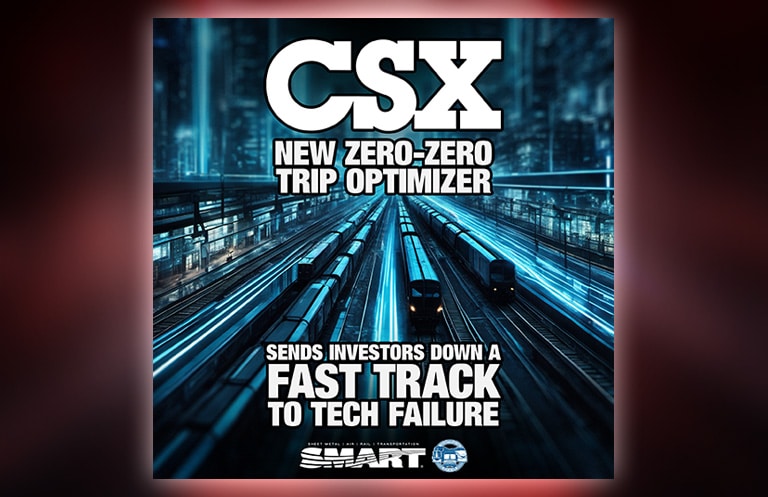
WASHINGTON, D.C. – SMART-TD is raising concerns over CSX’s petition for the Federal Railroad Administration to approve a new Trip Optimizer Air Brake Control system. This technology promises to automate freight train operations from start to stop. While CSX claims the system will reduce fuel consumption and emissions, SMART-TD believes these claims are little more than a smokescreen for CSX’s true intentions: cutting costs at the expense of safety.
CSX Proposal Represents a National Safety Issue
In response to CSX’s request, SMART-TD has put together an internal committee to research and write the union’s public comment opposing CSX’s petition to the FRA. This committee is made up of two State Safety and Legislative Directors (SLDs) whose states have CSX operations, (Bob Guy, Illinois) and (Don Roach, Michigan) and two SLDs from western states where CSX does not operate.
Brothers Don Gallegos (New Mexico) and Gabe Christenson (Nevada) both serve as part-time union officers while also actively taking calls and working trains at Union Pacific (UP) and BNSF respectively. Despite their already full plates, they are dedicating time and energy to this important fight.
Even though the SLDs from New Mexico and Nevada don’t have CSX rail lines in their territories, they recognize the imminent threat this move poses to the safety and well-being of all rail workers. Much like these two state directors, your opinions and concerns are valuable to our efforts to put together our objection as well. Even if you are not a CSX employee, please reach out to our Safety and Legislative Department with any on the job insight you can offer that helps us form an argument against allowing this technology to run our trains with less human control than we have now.
Environmental Claims: A Convenient Fig Leaf
CSX has positioned the Trip Optimizer Air Brake Control system as a step toward environmental sustainability, claiming automation of acceleration and braking will reduce fuel consumption and lower emissions. Fuel is the second-largest expense for railroads, trailing only labor. Railroads, along with the American Association of Railroads (AAR), have long used environmental claims to disguise their primary motive of reducing both their fuel and labor costs.
The Risks of Automation in Railroading
The Trip Optimizer system may automate key operations, including control of air brakes. But here’s the reality: this technology is not ready for prime time. Trip Optimizer has been in use for nearly 20 years, and it has consistently failed to perform basic train operations effectively. The system often struggles with throttle control, making erratic adjustments that violate CSX’s own operating rules. Even so, CSX wants to trust this technology with the most crucial safety function on the train, our air brakes.
Wabtec, the company behind the system, understands that Trip Optimizer relies on Positive Train Control (PTC), yet PTC is based on the train lineup, not signal speed. This means that a train could blow through a crossover at 45 mph, even if a signal indicates a 30-mph speed limit. We all know CSX and the other carriers would consider this a small flaw in the program, but if the crew doesn’t catch the mistake and fix it, the small flaw becomes a de-certifiable 15mph overspeed event.
Automated Trains are A Dangerous and Flawed Proposal
A computer system or an algorithm cannot replace the skill, judgment, and adaptability of a trained engineer and conductor. Allowing a system that depends on flawed technology to control the train’s most essential safety feature is a dangerous gamble.
This proposal is similar to allowing autopilot technology to control an aircraft’s takeoff and landing. The aviation industry or the American public would never accept this idea. It’s a solution that prioritizes cost-cutting over the lives and safety of railroad workers.
A Call for Accountability
CSX and Wabtec must prove that the Trip Optimizer system will not compromise safety. The FRA is responsible for ensuring that any waiver for new equipment meets the basic standard of maintaining or improving safety, not jeopardizing it. CSX and Wabtec must demonstrate that this system will not put workers at risk, and given the system’s flaws, it’s difficult to see how they could make such a case.
We Won’t Sit Quietly
This proposal is reckless, and we will fight it every step of the way. Join us in standing up for the safety of railroad workers and the integrity of our work.
If you have concerns or input you want included in SMART-TD’s formal comment to the FRA, please contact SMART-TD’s Safety and Legislative Department at dbanks@smart-union.org by March 1. Your voice is crucial in this fight.
Let’s stand together and show CSX and the FRA that we will not allow them to undermine our safety, our work, and our rights.
Related News
- California SMART-TD Brother Killed on the Job
- Union Mourns the Loss of Brother Charles Harrison
- FRA Issues Grade-Crossing Safety Advisory
- Amtrak To Give SMART-TD Members Holiday Bonuses
- Federal judge orders release of Kilmar Abrego Garcia from immigration detention — General President Coleman responds
- SEPTA Strike Avoided: Strong Agreement Secured
- DC attorney general secures $1.5 million from construction company for wage theft, worker misclassification
- Posthumous Retirement Ceremony Honors Lost Brother
- SMART-TD: Built by Members, Driven by Your Voice
- Conductor, Volunteer Firefighter Injured and Needs our Help